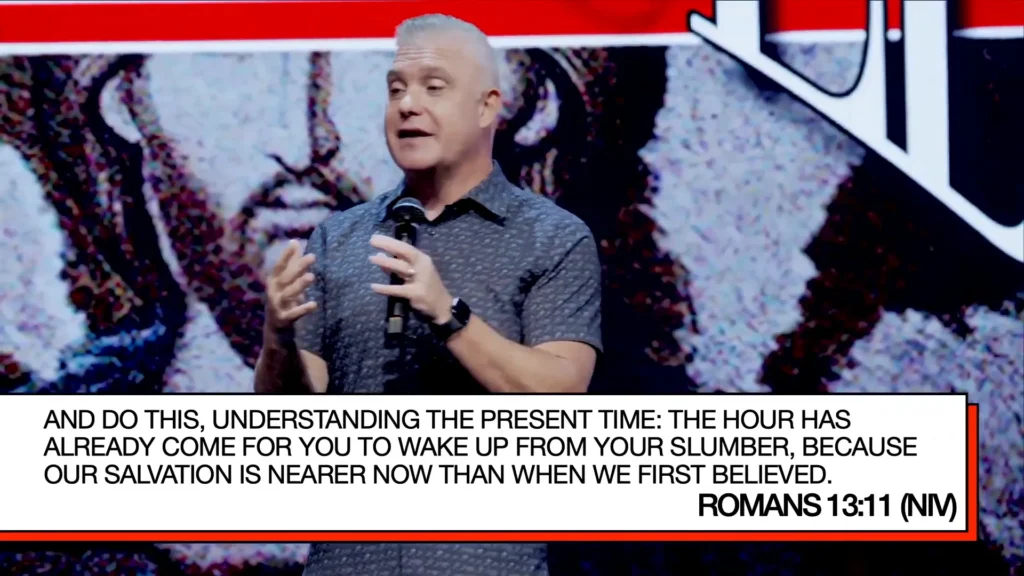What Would Jesus Undo | Week 2 | Pastor Ben Pierce
What Would Jesus Undo? Addressing Complacency and Indifference
In a world filled with distractions and self-sufficiency, many believers find themselves drifting into complacency and indifference towards their faith. In this insightful message, Pastor Ben Pierce challenges us to examine our spiritual lives through the lens of Jesus’s teachings and to reignite our passion for God.
The Dangers of Complacency and Indifference
Complacency and indifference can creep into our lives, often unnoticed. When we become comfortable in our routines, we risk losing sight of our spiritual fervor. The danger lies in mistaking routine for relationship. It’s essential to remember that faith is not merely a set of practices; it’s a vibrant relationship with God.
Understanding Complacency
Complacency is an insidious enemy. It can lead us to a place where we feel satisfied with our spiritual status quo. We may attend church regularly, participate in community events, and even read our Bibles, but if our hearts aren’t engaged, we risk becoming spiritually stagnant.
- Signs of Complacency:
- Reduced enthusiasm for prayer and worship.
- Less engagement with scripture; reading becomes a chore.
- Absence of spiritual growth or desire to serve others.
Consequences of Indifference
Indifference, on the other hand, signifies a lack of concern or interest. It can manifest in various ways, including ignoring the needs of others or failing to respond to God’s call in our lives. When we become indifferent, we risk missing out on the blessings that come from being active participants in our faith.
- Effects of Indifference:
- Disconnection from the church community.
- Lack of empathy and compassion towards others.
- Spiritual apathy leading to a weakened faith.

Personal Encounter with God
Reflecting on personal encounters with God can reignite our passion. Many of us have experienced moments that changed our lives. These encounters serve as reminders of the transformative power of faith. It’s crucial to revisit these moments and allow them to inspire us to seek deeper connections with God.
When we remember our first love for Christ, we can reignite that fire. Passion for God often begins with an encounter that shakes us to our core. This initial spark can be fanned into a flame through intentional actions and choices.

Cultivating Spiritual Passion
Spiritual passion doesn’t maintain itself; it requires active cultivation. Like a garden, it needs tending, watering, and sunlight. Here are some practical ways to cultivate that passion:
- Daily Devotion: Set aside time each day for prayer and Bible reading. This consistent practice keeps us connected to God.
- Service Opportunities: Engage in service within your community. Serving others can reignite the joy of our faith.
- Accountability Partners: Find someone who can encourage you in your faith journey. Sharing experiences can help maintain enthusiasm.
- Spiritual Retreats: Take time away from daily distractions to focus on your relationship with God.

Life’s Distractions and Their Impact
Life is full of distractions that can lead us away from our spiritual pursuits. Whether it’s work, family responsibilities, or social obligations, these distractions can pull our focus from what truly matters. It’s essential to recognize these distractions and actively seek to minimize their impact on our spiritual lives.
We must be intentional about making time for God amidst the chaos. Prioritizing our relationship with God can help us navigate life’s challenges without losing our spiritual fervor.

Letters to the Seven Churches: A Historical Context
The letters to the seven churches in Revelation offer profound insights into the spiritual state of the church throughout history. Each letter addresses specific issues that reflect the challenges faced by early Christians, many of which resonate today. Understanding these letters can help us identify our own spiritual health.
As we study these letters, we can see how complacency and indifference were addressed by Christ. They serve as a reminder that we are not alone in our struggles; the early church faced similar challenges and received guidance from Jesus through these letters.

Identifying the Faithful vs. the Indifferent
In examining our spiritual lives, it’s crucial to identify where we stand: are we among the faithful or the indifferent? The letters to the churches provide a framework for self-examination. Jesus calls us to assess our actions and attitudes toward our faith.
- Characteristics of the Faithful:
- Active engagement in worship and community.
- A thirst for knowledge and understanding of scripture.
- A heart for service and outreach.
- Indicators of Indifference:
- Routine without relationship; actions without heart.
- Disinterest in spiritual growth or community involvement.
- Ignoring the call to serve and love others.
By reflecting on these characteristics, we can better understand our spiritual state and make necessary adjustments. The goal is not to condemn, but to inspire action and growth.

Pain with Purpose vs. Existence without Purpose
Living a life filled with purpose is a central theme in the Christian faith. It’s vital to understand that experiencing pain is often part of this journey. However, having pain with purpose is far superior to existing without any purpose at all. Pain can lead to growth, deeper faith, and a clearer understanding of God’s will for our lives.
When we face challenges, we can choose to see them as obstacles or as opportunities for growth. The latter perspective shifts our focus from mere survival to thriving spiritually. Embracing difficulties can lead to a stronger relationship with God, as we rely on Him during our trials.

The Value of Purpose
Purpose gives direction to our lives. It motivates us to act and make choices that align with our beliefs. Without purpose, we may drift aimlessly, allowing distractions and indifference to take root. This is where spiritual indifference can flourish, leading us away from our intended path.
Finding and embracing our God-given purpose not only benefits us but also impacts those around us. We are called to be vessels of God’s love and truth, sharing our experiences and helping others find their way as well.

Transformative Pain
Transformative pain is an essential aspect of spiritual growth. It can refine our character and deepen our faith. The Bible is filled with stories of individuals who faced immense challenges, yet emerged stronger and more resilient in their faith. Consider Job, who despite his suffering, remained faithful to God. His story illustrates that pain can lead to greater understanding and appreciation of God’s grace.
In our own lives, we can find meaning in our struggles. Rather than asking “Why me?” we can ask “What can I learn from this?” This shift in mindset opens the door to healing and growth, allowing us to see our challenges as part of God’s plan.

The Call to Action: Turning from Indifference
As we reflect on the themes of complacency and indifference, it’s crucial to recognize the call to action that God places on our lives. We are not meant to be passive observers of our faith. Instead, we are called to actively engage with God and His mission. Ignoring this call can lead to spiritual stagnation.
Turning from indifference requires intentionality. It involves making conscious choices to prioritize our relationship with God and to seek out ways to serve others. This can be as simple as spending more time in prayer or reaching out to someone in need.

Embracing Change
Change is often uncomfortable, but it is necessary for growth. To reignite our passion for God, we must be willing to embrace change in our lives. This may mean stepping out of our comfort zones, trying new forms of worship, or getting involved in community service.
When we embrace change, we open ourselves up to new experiences and deeper connections with God. It allows us to break free from the confines of indifference and complacency, leading to a more vibrant spiritual life.

Practical Steps to Combat Indifference
To combat spiritual indifference, consider implementing these practical steps:
- Set Spiritual Goals: Define what you want to achieve in your spiritual journey. This could include reading the Bible in a year, praying daily, or volunteering regularly.
- Engage in Community: Join a small group or Bible study. Surrounding yourself with like-minded individuals can encourage growth and accountability.
- Seek Mentorship: Find someone who can guide you in your faith. A mentor can provide wisdom, encouragement, and support.
- Practice Gratitude: Regularly reflect on the blessings in your life. Gratitude shifts our focus from what we lack to what we have, fostering a deeper connection with God.

Invitation for Spiritual Renewal
The invitation for spiritual renewal is open to all. No matter where you find yourself on your spiritual journey, there is always an opportunity to recommit to God and His purpose for your life. This renewal can be sparked by a simple prayer, a moment of reflection, or a heartfelt desire to draw closer to God.
If you feel the tug of indifference in your heart, take a moment to pause and reflect. Ask God to reveal areas in your life where you may have become complacent. Surrender those areas to Him, and invite His spirit to reignite your passion for Him.

A New Beginning
Every day is a new opportunity to start fresh. God’s mercies are new every morning, and He is always ready to welcome us back into His embrace. No matter how far we may feel we have drifted, His love remains constant and unchanging.
As you move forward, remember that you are not alone in this journey. Embrace the community of believers around you. Together, we can encourage one another to rise above indifference and to live out our faith with fervor and purpose.

